DIY Upper and Lower Cabinet Lighting Tutorial
February 01, 2024
Share this
How to install upper and lower cabinet lighting without an electrician.
Years ago when I was finishing up our kitchen renovation at our last house, this lighting addition was the last project to complete the transformation.
There are a few ways to add your own lighting above and below your kitchen cabinets, and I'm sharing two of the easiest options here.
This DIY project adds so much warmth and interest to a kitchen, but it also functions well because it creates great task lighting at night:
This post may contain affiliate links for your convenience.
I may earn a small commission when you make a purchase through links.
See my policies and disclosure page for more information.
The first time I tackled this project, I used the outlets from our hanging microwave and behind the refrigerator to add plug in cabinet lighting.
The lights and rope lights I shared years ago have a warmer glow, but it's a lot harder to find those specific incandescent strips now. Also, they do burn out eventually and are bulkier.
I much prefer the LED light strips now, and that's what I've used for the past few years. That tutorial is still helpful no matter which option you choose!
I used a similar process of using existing outlets for the cabinet lighting in our basement kitchenette:
We have an outlet behind the fridge that I was able to access.
I cut a hole into the side of the cabinet and then ran the cord for the lighting through that:
Incredibly easy! This Govee strip lighting is what I used for the lights under these cabinets. We can turn it on at the switch or from an app on our phones.
The LED lights in this tutorial will last (nearly) forever, are cool to the touch, have a much less intrusive design and are easier to maneuver.
I'll go into to more detail on the pros and cons of this LED lighting later in the post.
DIY cabinet lighting materials
The LED lights I used the first time I attempted this project are easier to use than rope lighting because they are so tiny and come with a sticky back. That's a big help.
These are the lights I used:
When I bought these years ago, they only came in one "temperature" that was a bit cooler than I preferred (but still looked great!). Now this brand offers many colors and temperature options to pick from.
I recommend the 2700k lights if you prefer warmer, incandescent-like lighting. The 3100k is cooler and more neutral.
Here they are lit up:
If you purchase these, you will need this power adapter for each run -- I bought two, one for the under cabinet lighting and one for the uppers:
I had an outlet installed (connected to a switch) before we finished up the drywall in the kitchen. It's on a wall at the end of the upper cabinets, and I had it placed low so it's hard to see:
You do not have to have a dedicated outlet, it just makes the lighting less intrusive to the overall kitchen design and makes it easy to operate from a switch.
This project can also be completed using outlets from behind appliances.
Running a dedicated outlet up from an existing one at countertop level is a fairly easy task for an electrician, so don't worry if you don't already have one!
I used plastic cord hiders to hide all the cords on this project -- I use these all over my house:
I hate cords -- it's my thing. I think they can ruin a beautiful project quick so I always have them on hand. Check out all the ways I hide cords!
Cabinet lighting installation
For the lower lights I ran the cord and cover up inside the cabinet on the left inside. For the uppers I ran the cover down the left side of the cabinet, behind the trim:
You only see it if you look for it. There's a slight bump where the adapter and lights connect but other than that it's seamless. If someone ever notices it you know what I give them -- a cookie. :)
The strips have a sticky back -- so peel the paper off and just stick it to your surface. Mine stuck fine to painted and unfinished trim.
For the lower cabinets I just ran the lights along the back of the DIY light rails I installed:
For the uppers I ran it along the back of the header. I drilled holes between each set of cabinets and threaded it through:
When you get to the end of where you need the lights, cut them. Make sure to do this where the little scissor marks are and make sure they are not plugged in!:
Now, you can cut this, then reconnect to another section by using a soldering iron or their quick connectors and then continue them.
So if you have a spot where you want the lights, then a break, then you want them again, this is your solution, but only using one 16-foot length section of lighting (per the manufacturer).
I bought the iron because I thought I'd have a break in the cabinet over our fridge. I pulled the light through in the back of the cabinet (where it met up with the other cabinets that are further back) and needed to get that light to the front of that cabinet (to attach the lights to the back of the header). To do so meant running it along the sides, which you would see.
Instead of trying to connect the strips, I came up with a simpler solution.
I went ahead and ran the lights along the sides of that cabinet, and then picked up some tiny crown molding (found mine at Home Depot):
Then I installed it a little low so you can see the glow of the lights coming out of the top:
Remember these are LED lights so they stay very cool to the touch.
This is a lighting trick you can use with regular crown molding too! It's a cool look, especially in a basement or theater room. It offers low ambient light in a room that you want mostly dark. Just make sure not to have your crown go all the way to the ceiling.
If I had connected wire I would have had to hide that running along the sides anyway, so this was an easier solution.
Upper and lower cabinet lighting result
I just love, LOVE warm accent lighting, especially in a kitchen!:
This really shows the true look of them when they are on. This was during the day and they look warmer here. They are LOVELY! I love the low light at night.
These are easy to install on one bank of cabinets like we have here. They'd also work great in a bookcase or built ins.
Once you've had under cabinet lights it's hard to go without them!
These lights are really great for task lighting in a kitchen at night, even with all of the overhead lighting on:
Pros and cons to this type of LED cabinet lighting:
- This method works best if you have one run of cabinets you are lighting up. You'll need an outlet for each set of cabinets.
- There are remote switches you can use to turn on your lights if you connect them from a non-dedicated outlet.
- These lighting strips are easily manipulated and can be placed almost anywhere!
- These are not dimmable with a standard dimmer, but you can add this dimmer for LED strip lights. It's manual though, so it needs to be in a spot where you can reach it. It would be ideal for under the cabinets -- you could attach it underneath and adjust the light.
If you have any questions about this process please let me know. These are a really affordable and energy efficient way to add accent lighting to your kitchen!
Here's an image to pin for later if you are interested:
Here are a few more of my favorite DIY lighting projects!
Never miss a post by signing up to get posts via email.


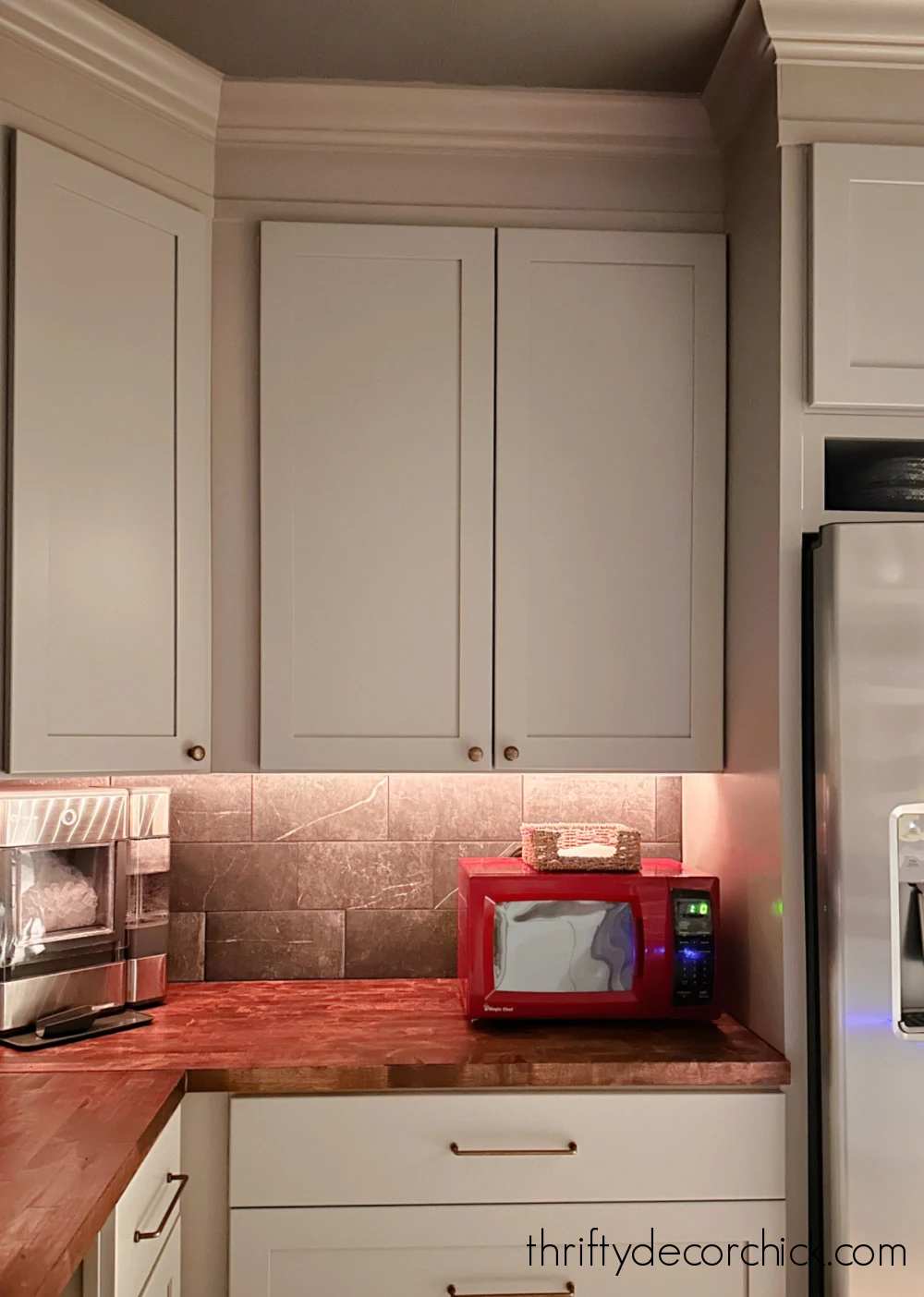


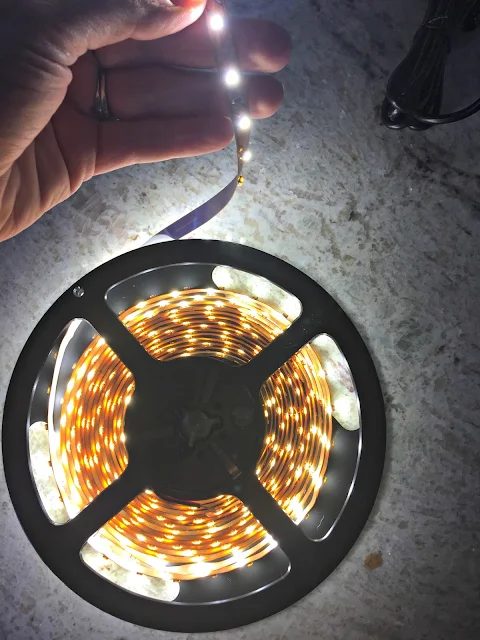












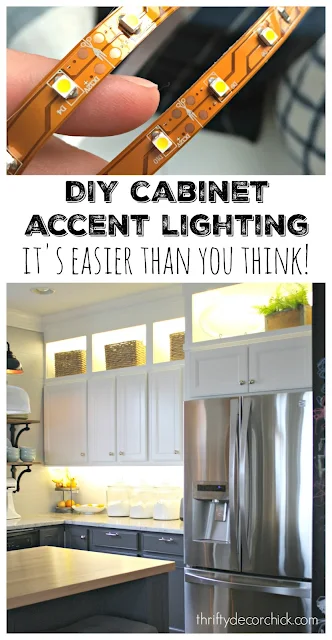
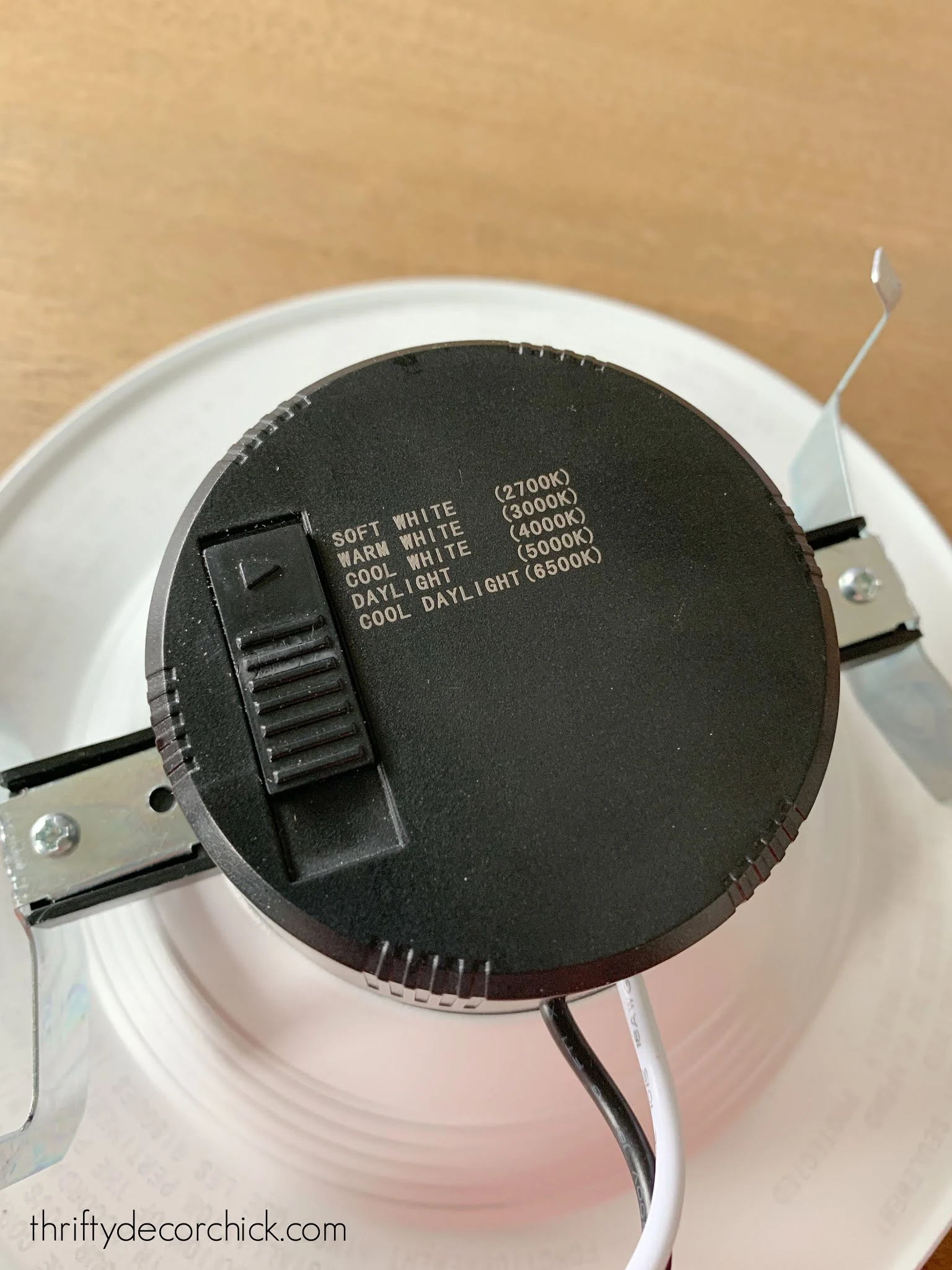

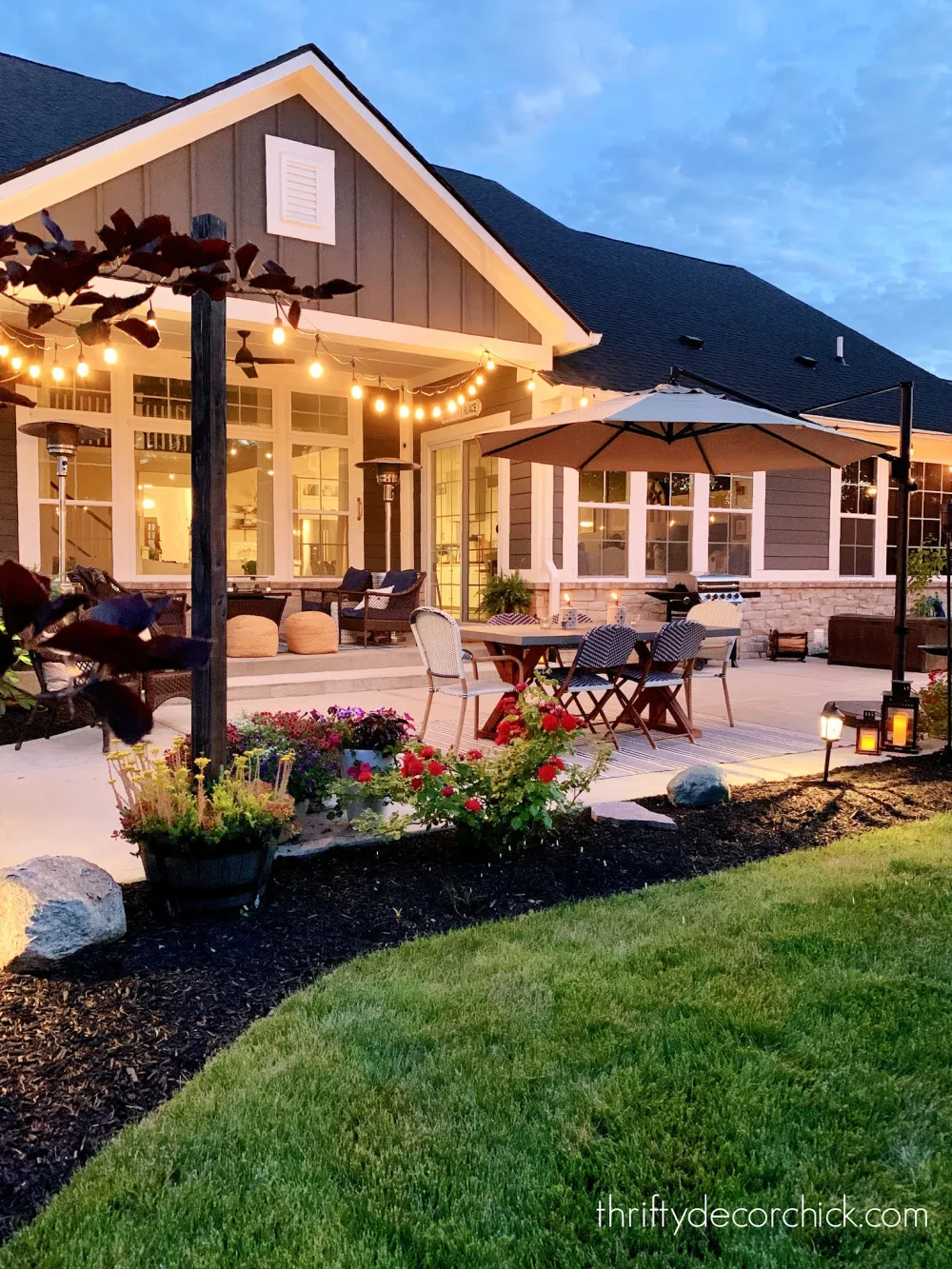
This is stunning! I've never seen this before. So beautiful!
ReplyDeleteMel | www.thegossipdarling.com
What a great idea, I've never seen these before either.
ReplyDeleteBookmarked thank you! I'm going inside my pantry (similar to yours) but these are a great option.
ReplyDeleteAwesome results! I'm fortunate enough to have my under cabinets lit, but now am pondering doing above.
ReplyDeletehttp://www.theartfulscavenger.com/#!Designer-Peeves/cmbz/5697dd6a0cf2e94e3fb7a77c
Awesome. May I ask what color gray you used on your lower cabinets?
ReplyDeleteOh, I love these lights! I added them to the built-ins in my bedroom like three years ago, no trouble at all with them. It's also hard for me to take pictures while the lights are on, they don't do justice to how nice the room looks. Your kitchen is a stunner!
ReplyDeleteWhere did you get your light strips? My new kitchen cabinets go in next week and this would be a much better option than what we were thinking as I want narrow coffee mug shelves running under my cabinets.
ReplyDeleteOh I love this! I've wanted to DIY this forever but it always seemed like such a hassle. Granted, I don't have a socket to do this right now but for future reference this is fab ;-)
ReplyDeleteJust to be clear, you have a black cord running up to the outlet from the lower lighting, correct? Is that the transformer wire that plugs into the outlet above? Where did you plug in the transformer for the bottom lights? For some reason, I'm confused on this process and it looks like it's so simple! Thanks for the help. I have seen someone use a router on the bottom of their wood shelves and attach a strip of lights in the groove so that lights are possible there too, but I'm not sure how they got power to them. It looked beautiful though.
ReplyDeleteI found your blog and this was the answer to what to do after I removed my soffit. Thank you for all your beautiful work and your wonderful step by step! This is a link to my kitchen reno and my lighted cabinets, that you inspired!!.
ReplyDeletehttps://www.instagram.com/p/BOX6czQA9nn/?taken-by=heartofflint&hl=en
Hi Sarah, We'll be remodeling our kitchen soon and I wonder about additions to cabinetry, such as the light rails, and matching paint. In your new kitchen, when you weren't painting the cupboards, did you feel the paint matched well with the new cupboards? Did you take a door for color matching at Home Depot (or the like)? How did you find the extra paint needed for the light rails and the lovely feet? I looked for the answer to my question but couldn't find a link. Thanks, Marilyn
ReplyDeleteJust take a cabinet door to the paint store and they will match it. :) You'll want a sheen that will match your cabinets too. :)
DeleteStunning and clever; well done! Thank you for sharing.
ReplyDelete